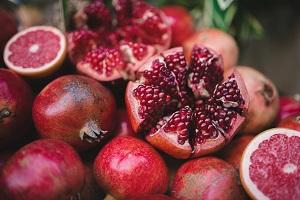
Originating from the south of Asia, Persia, and Afghanistan, pomegranate is an ancient fruit that has been cultivated by many cultures for thousands of years throughout the Mediterranean region of Asia, Africa, and Europe. International trade in pomegranate will be facilitated thanks to a new UNECE standard that will help traders source pomegranates of high quality – with mutual benefits to producers and consumers.
Although pomegranate accounts for a small share in the total turnover of fruit and vegetables in the world, its consumption is growing rapidly. The world surface dedicated to the cultivation of pomegranate trees is more than 300,000 ha. The leading producers globally are India and China followed by Iran, Turkey, Afghanistan, the US, Iraq, Pakistan, Syria and Spain. Total import volume to the EU grew from 67,000 tonnes in 2013 to 95,000 tonnes in 2017. In Central Asia, Uzbekistan is taking the role of one of the largest producers in Central Asia. According to its Ministry of Agriculture, the country has a plan to increase the total area of pomegranate orchards in the Fergana region to 20,000ha, from which more than 200,000 tons of pomegranate would be harvested per year.
In the European market, Spain has one of the largest production of pomegranates, reaching up to 50,000 tones, and its cultivation is concentrated mainly in the region of Alicante, Valencia, and Murcia. Looking at the main destination for pomegranate in Europe – Germany is the largest importer followed by Italy, France and the United Kingdom.
Rich in fiber, protein and vitamins, the fruit symbolizes longevity, abundance, and fertility and is increasingly used in cosmetic and pharmaceutical industry. Due to its high antioxidant potential, pomegranate, and its byproducts, such as juice, seeds and peel are considered to have many positive health effects, including antibacterial and anticancer properties. Regarding trade, it has been valued for its thick skin that prevents dehydration and enables transportation at long distance without affecting its quality, thus reducing the risk for spoilage and food loss.
The new UNECE standard for pomegranates provides agreed minimum quality criteria that can be referenced in commercial contracts, helping buyers source products of similar quality. At the same time, it provides a reliable reference to the farmers and traders, and ensuring high-quality for consumers, which ultimately is expected to help stimulate trade in the product. The standard, initiated by Spain, was adopted at the Seventy-sixth Session of UNECE’s Working Party on Agricultural Quality Standards.
In total, UNECE proudly hosts over 100 agricultural quality standards for fresh fruit and vegetables, dry and dried produce, meat, seed potatoes, cut flowers, eggs and egg products. The standards are used internationally by Governments, producers, traders, importers, exporters, and international organizations and they contribute to international trade of fruits and vegetables and support achieving Sustainable Development Goals to build resilient and inclusive food systems that prevents food loss.

